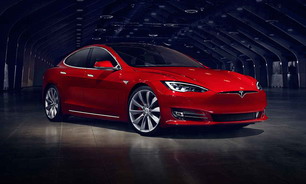Tesla Model 3 threatens German luxury sedan sales in the U.S.

The German automaker has been ceding ground in the U.S. luxury market this year to rivals Mercedes-Benz and Audi, hamstrung by plunging demand for its top-selling model, the 3 series. That entry-level luxury sedan segment is about to be challenged further by the long-awaited Model 3 that Tesla began handing over to employees last week.
While Tesla CEO Elon Musk has touted the Model 3 as more of a mass-market electric vehicle, the cost of the $35,000 base model is similar to the 3 series, the Mercedes C class or the Audi A3. Adding options like the autopilot driver-assistance system and an extended battery range can stretch the price to $59,500, positioning the sedan firmly in the luxury-car segment.
Tesla is "bringing people who could afford entry luxury into the market," said Jessica Caldwell, an analyst with car-shopping website Edmunds. "Especially people who live in urban areas and maybe don't drive as much or take public transport, this is a car for even those people to be swayed into the auto market, where maybe the C class wasn't really speaking to them."
BMW's 3-series deliveries in the U.S. plummeted 40 percent in July, contributing to the brand's 15 percent sales decline. Daimler's Mercedes C class, which has largely defied the trend of weak passenger-car sales this year, succumbed to the demand drift in July, falling 22 percent. Total deliveries for Mercedes cars and light trucks slipped 9.2 percent.
Toyota Motor Corp.'s Lexus, which has been the worst performer among the top four luxury brands this year, rebounded in July with a 3.6 percent gain. Sales of its ES sedan jumped 21 percent.
Source: Bloomberg


